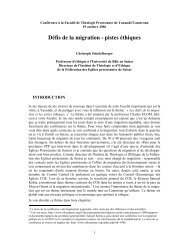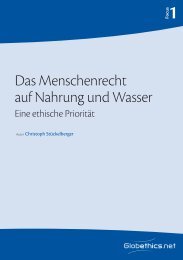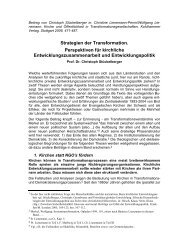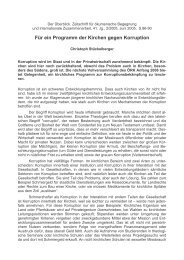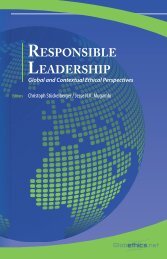BREAK THE CHAINS OF OPPRESION AND THE YOKE OF ...
BREAK THE CHAINS OF OPPRESION AND THE YOKE OF ...
BREAK THE CHAINS OF OPPRESION AND THE YOKE OF ...
You also want an ePaper? Increase the reach of your titles
YUMPU automatically turns print PDFs into web optimized ePapers that Google loves.
PREAChing who believe that “those at the top” will do what they feel like doing anyway? I<br />
believe that everyone, in fact, has the potential to do something. But only when<br />
the preacher is prepared to go beyond ageneral appeal, “earths” it and comes up<br />
with some concrete ideas as to how the congregation can follow up this directive<br />
concretely: through asking such questions as: “What do you pray for?”, “For<br />
whom do you vote?” and “Is the maxim ‘learn to share’ part of the way in which<br />
you bring up your children?”<br />
One more comment on this: we should avoid playing off the different ways of<br />
taking action against one another (as many of us, including myself, have done in<br />
the past): active struggle against contemplation, political action against local initiatives,<br />
missionary work against social commitment. Instead, in learning from<br />
the New Testament teaching on talents and gifts we should encourage each<br />
member of our congregations to discover their own gifts and potential and to use<br />
these on the path of justice. 6<br />
2. Anyone admonishing his or her congregation should reflect on the likely consequences.<br />
I have never forgotten the following incident: as a young minister, I<br />
spoke with great conviction and in fiery words in calling on my congregation to<br />
boycott products from the apartheid regime.<br />
This included silver Krugerrands being offered at the time in our banks. A<br />
woman who helped out at the weekly children’s services, called me up to ask:<br />
“After applying for 50 jobs, I now have the chance of a job with the Deutsche<br />
Bank; should I take it? If I do, I will have to sell those coins you spoke about in<br />
the church on Sunday.” This scene set me thinking and made me ashamed of<br />
myself. Our purpose should not be to rob our directives of all their essential clarity<br />
and radicalism.<br />
But as preachers, �we should � be �aware of what we �are �expecting<br />
of our congregations.<br />
It does not cost a theologian much (at least not in my context) to commit<br />
him/herself to economic and ecological justice. On the contrary, in return for<br />
simply showing sufficient commitment, he or she might even be awarded a<br />
church commission and get the chance to meet lots of interesting people<br />
throughout the world. For the members of our congregations, however, a similar<br />
commitment may be a matter of life and death. We must be aware of this, and an<br />
appreciation of their difficulties must also be perceptible in our preaching.<br />
I have left the most important aspect to the end: even where the sermon is focusing<br />
on the obedient action of the people, it must not cease to speak about God.<br />
For, according to biblical and Reformed understanding, it is not only our justification<br />
that is the work of God alone, but our sanctification too (cf. 1 Cor 1:30;<br />
1 Pet 1:2). Of course, this sanctification does not occur without us: God has<br />
6 In this respect, the “Plan of Action” is very helpful, as it demonstrates the whole variety<br />
of what can be done.<br />
��������������������������������������������<br />
� � � ��������������������<br />
�<br />
�<br />
– PREACHING ON JUSTICE – 21



